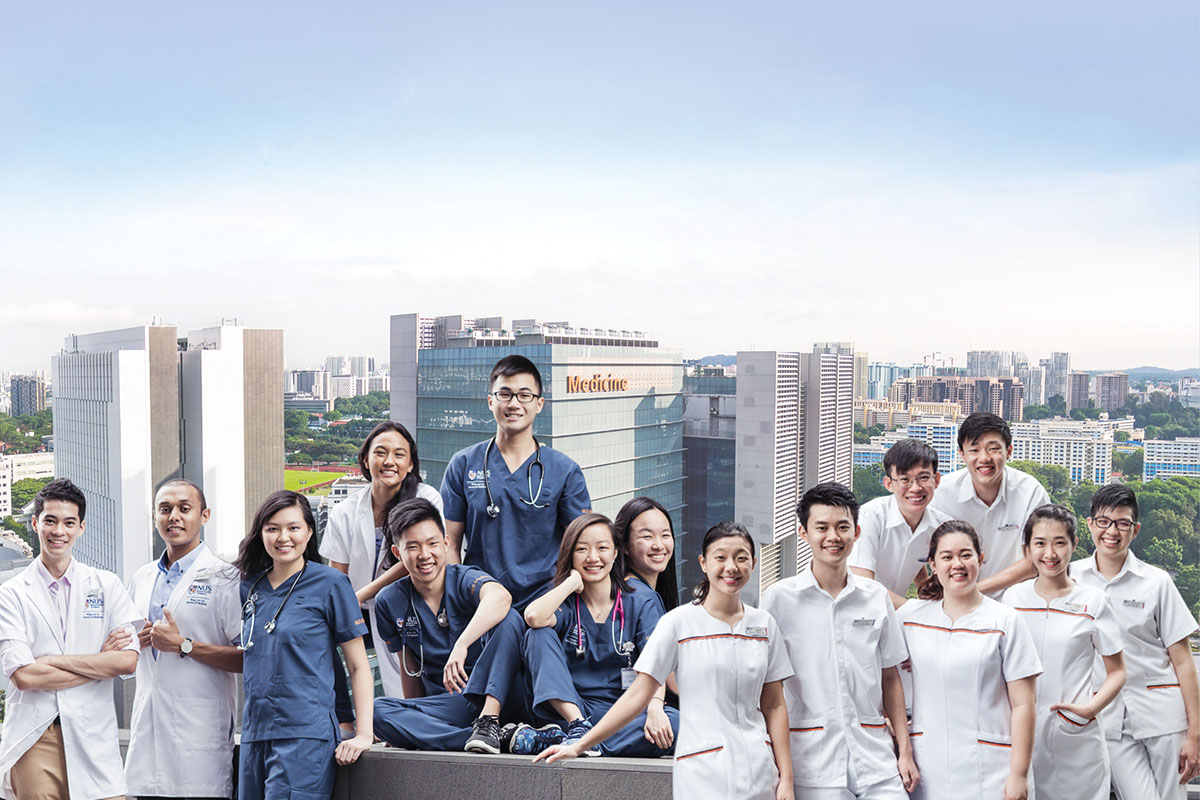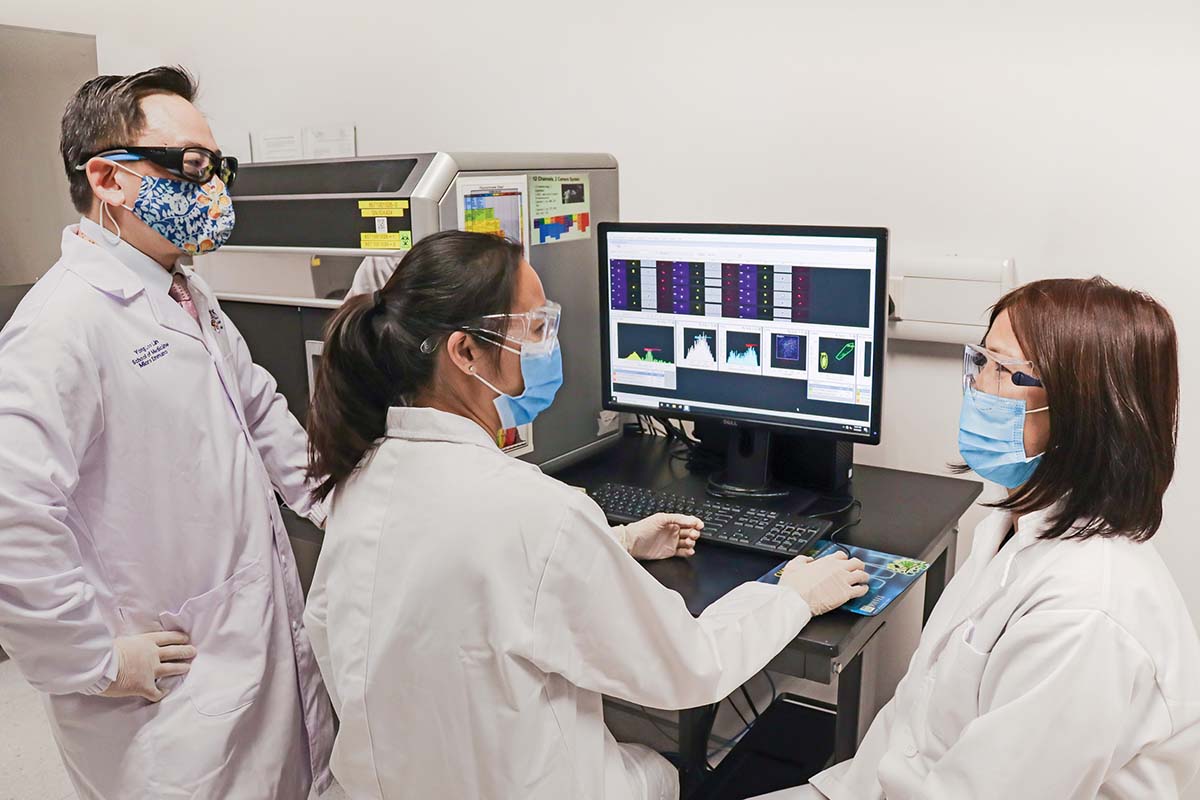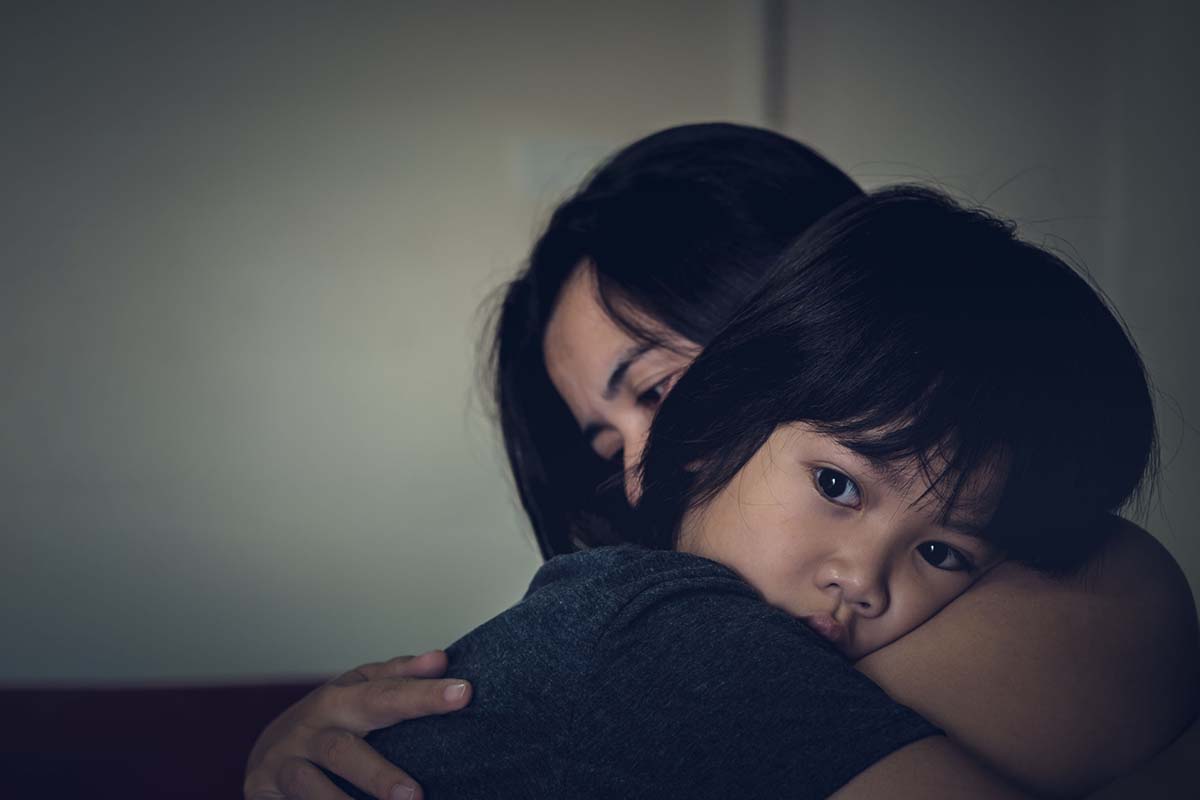
Issue 41 / February 2022
DOSSIER
MEGICal Highlights from NUS Medicine Educators’ Day 2021

In conjunction with Teachers’ Day, NUS Medicine organised online events to celebrate our educators’ achievements, particularly in driving education innovation and in rising to the challenges of the COVID-19 pandemic.
wo lunchtime seminars offered the opportunity to showcase how clinical teaching has been successfully adapted and enhanced under COVID-19 restrictions.
Dr Benjamin Goh from the National University Hospital shared how the Department of Surgery has pivoted and adapted their teaching through two new programmes: EXCEL (EXploration, Clinical Examination and Lateral Thinking) and PECCS (Professionalism, Ethics, Communication in Consent taking in Surgery). These programmes are designed to strengthen students’ ability to apply their knowledge in clinical settings, as well as to improve communication skills and collaboration.
Adjunct Associate Professor Samuel Chew described how the Geriatric Medicine Student Internship programme at Changi General Hospital addressed the challenges of the COVID-19 pandemic. The experience proved the educators’ adaptability, particularly in ensuring everyone’s safety while maintaining focus on the importance of clinical training and responsiveness to the needs of students, trainees and tutors.
Dr Janthorn Pakdeethai and Dr Ira Sun also shared about efforts at Ng Teng Fong General Hospital to adapt and adopt practices to work around challenges arising from segregation, access restrictions and other COVID-19 measures, as well as efforts to boost effective communication and promote collaboration with partner institutions.
8
MEGIC finalist
teams presented
their work
Dr Clement Chia and Dr Shaun Chan spoke about the work done at Khoo Teck Puat Hospital to promote interprofessional collaboration and independent learning in medical undergraduates through “Learning Oriented Teaching in Transdisciplinary Education” (LOTTE). This programme brings together surgeons, physicians and students in a transdisciplinary effort to manage patients holistically and maximise opportunities for learning, knowledge-sharing and communication.
NUS Medicine Educators’ Day: celebrating innovation and resilience
The advances and innovations in medical education came under focus during the NUS Medicine Educators’ Day, which was conducted online on 15 October 2021. Adjunct Associate Professor Yip Chee Chew, Education Director of Khoo Teck Puat Hospital and Head of the Department of Ophthalmology and Visual Sciences, delivered the keynote address on “Supporting Impactful Learning During the COVID-19 Pandemic”, showcasing the wide-ranging efforts of his team to seek continued improvement in their teaching of medical students despite the challenges of COVID-19.
In addition, the NUS Medicine Educators’ Day event saw eight of the 15 teams who participated in the Medical Education Grand Innovation Challenge (MEGIC) presenting their proposed solutions to address unmet needs and opportunities to enhance medical education. These teams are made up of members from different professions, disciplines and institutions, exemplifying multidisciplinary collaboration.
The eight finalist teams presented their work to an esteemed panel of judges who included Vice Provost Associate Professor Erle Lim, Vice Provost for Teaching Innovation & Quality; Associate Professor Lee Kooi Cheng, Director of the Centre for English Language Communication and Dr Dujeepa, Director of the Centre for Development for Teaching and Learning and Director of the Centre of Medical Education.
Click here to see the e-exhibition of the MEGIC 2021 projects here:
Grand Prize
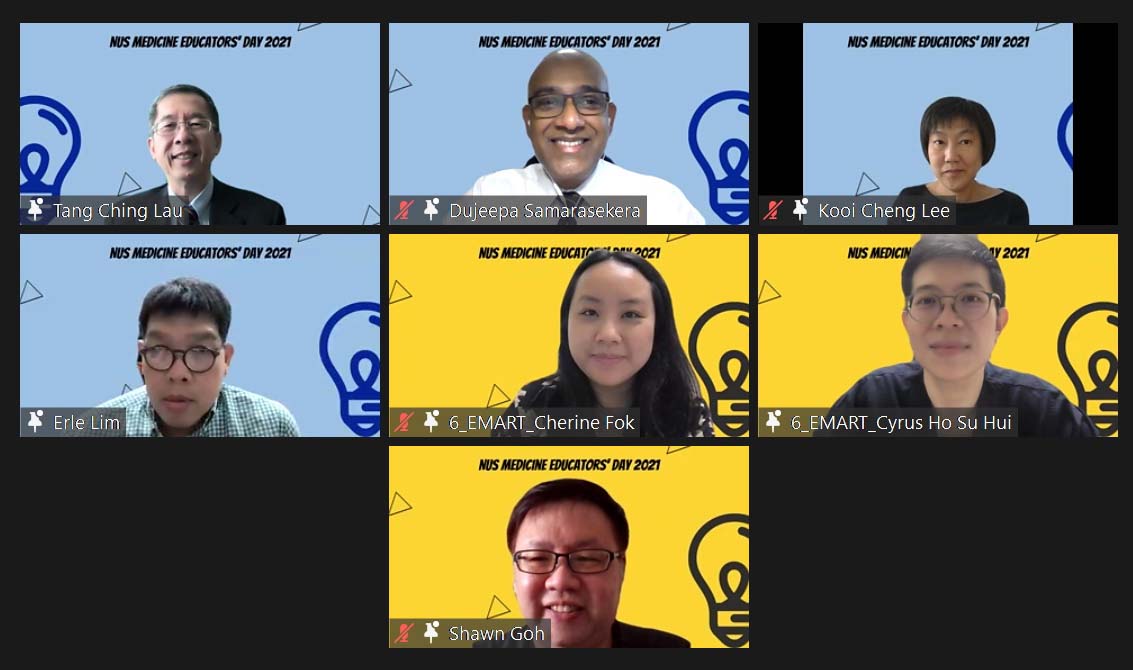
Grand Prize Winners, Team EMART, represented by: Dr Cyrus Ho, Ms Cherine Fok and Dr Goh Yong Shian. Not pictured: Mr John Yap, Mr Mak Hon Keat, Mr Ong Loong Siang, Ms Cecilia Chng, Ms Tricia Ng, Mr Ernest Yang and Dr Cheryl Chang.
Team EMART won the Grand Prize for their “Application of VRAM (Virtual Reality in Agitation Management) in students and healthcare workers”. The virtual reality (VR) software developed by the team simulates an agitated patient in a ward, providing students with opportunity to practise their communication choices and actions in a safe, controlled environment. The VR software trains learners to manage agitated patients with empathy and in the least coercive manner possible.
2nd Prize
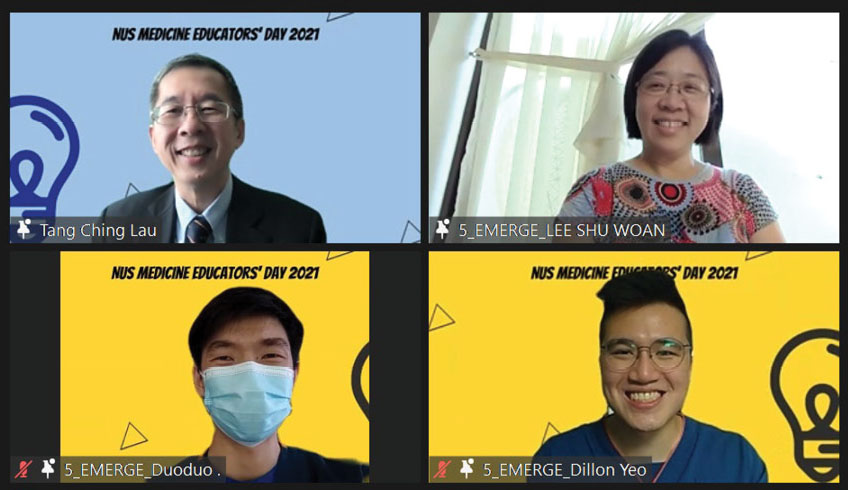
Second Prize Winners, Team EMERGE, comprising: Dr Lee Shu Woan, Dr Dillon Yeo and Mr Wu Duoduo.
Team EMERGE won the Second Prize for their project titled “RSI – Rapid Sequence Induction”. The project uses a board game as an educational tool to address gaps that emerged in the learning journey of students posted to Emergency Medicine during the COVID-19 pandemic.
3rd Prize
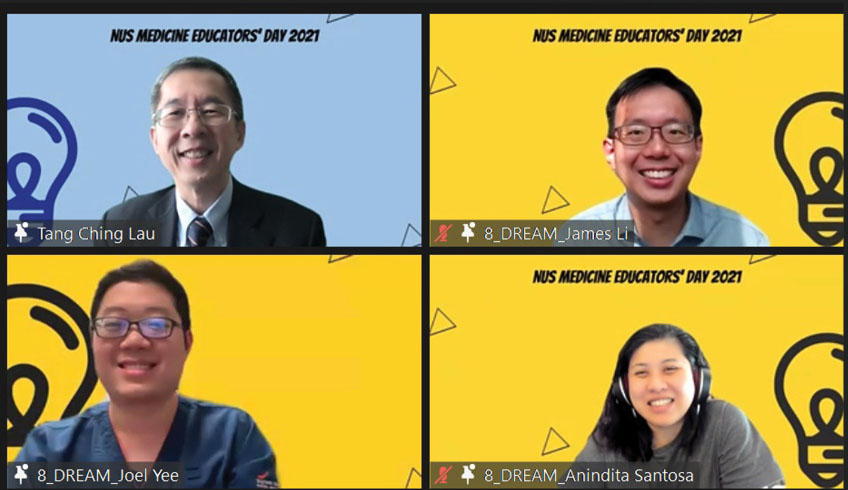
Third Prize Winners, DREAM Team from Changi General Hospital, comprising: Dr Li Weiquan, Dr Joel Yee and Dr Anindita Santosa. Not pictured: Dr Lydia Li.
DREAM Team won the Third Prize for their project “Deconstruct-Reintegrate Educational Assessment in Medicine (DREAM) Model for Clinical Reasoning in Medical Students”, which sought to make the DREAM model of teaching available on digital platforms.
Best Video
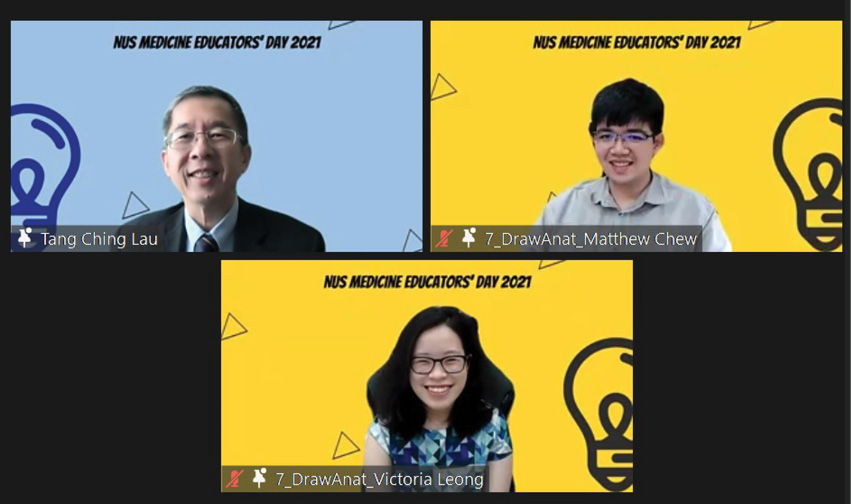
Best Video, Team DrawAnat, represented by: Mr Matthew Chew and Ms Victoria Leong. Not pictured: Mr Daniel Chew, Ms Kim Haejin, Mr David Chew, Dr Satish R.L., Mr Chua Yun Da and Mr Nicholas U Jin.
Team DrawAnat won the Best Video award for their project that teaches students how to draw simple anatomy diagrams to promote visual understanding.
Special Mention
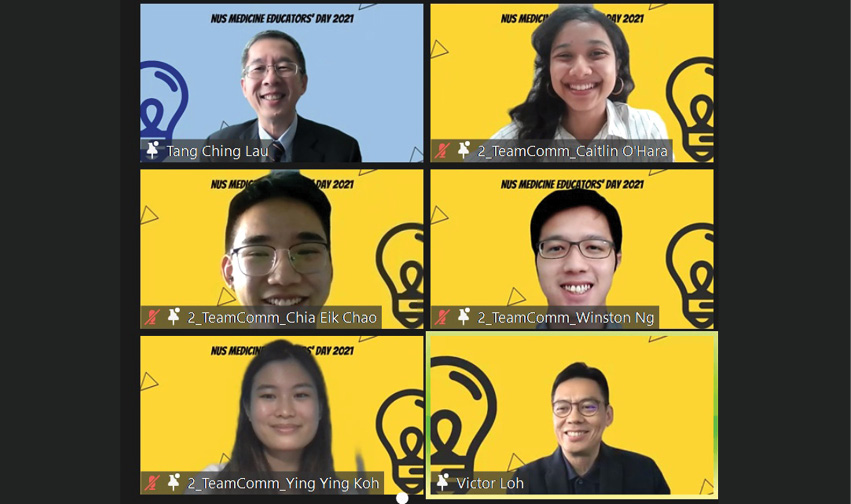
Special mention to Team Comm-petent, represented by: Koh Ying Ying, Caitlin O’Hara, Chia Eik Chao, Winston Ng and Dr Victor Loh. Not pictured: Dr Ann Toh.
Team Comm-petent won a Special Mention award for their project on “Communicating with patients with disability: a ground-up approach”, which proposed improved platforms to enhance communication with patients with disabilities.

